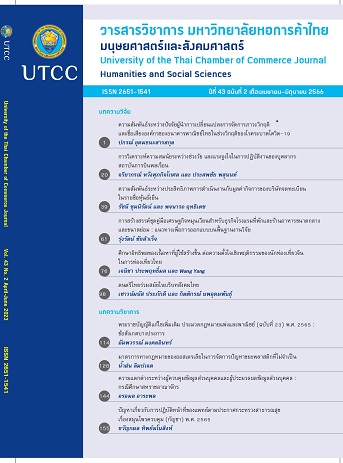ความสัมพันธ์ระหว่างปัจจัยผู้นำการเปลี่ยนแปลง การจัดการภาวะวิกฤต และชื่อเสียงองค์กรของธนาคารพาณิชย์ไทย ในช่วงวิกฤตของโรคระบาดโควิด-19
Main Article Content
บทคัดย่อ
การวิจัยนี้มีวัตถุประสงค์เพื่อศึกษาความสัมพันธ์ระหว่างภาวะผู้นำการเปลี่ยนแปลง การจัดการภาวะวิกฤตและชื่อเสียงองค์กรของธนาคารพาณิชย์ไทย โดยใช้แบบสอบถามเป็นเครื่องมือในการเก็บข้อมูลจากพนักงานระดับปฏิบัติงานของธนาคารพาณิชย์ที่มีรายชื่อในหุ้นยั่งยืน หรือ Thailand Sustainability Investment (THSI) ประจำปี 2564 จำนวน 284 ราย วิเคราะห์ข้อมูลโดยใช้โปรแกรม AMOS จากการวิเคราะห์โมเดลสมการโครงสร้าง (Structural Equation Model) ค่าไค-สแควร์สัมพันธ์ = 1.287, ค่าดัชนี CFI = 0.986, ค่า TLI = 0.967 , ค่า RMSEA = 0.036, ค่า SRMR = 0.040 โดยทุกค่าผ่านเกณฑ์มาตรฐาน ผลการวิจัยพบว่า 1) ภาวะผู้นำการเปลี่ยนแปลง ซึ่งประกอบด้วย การมีอิทธิพลอย่างมีอุดมการณ์ การสร้างแรงบันดาลใจ การกระตุ้นทางปัญญา และการคำนึงถึงการเป็นปัจเจกบุคคล มีอิทธิพลทางบวกต่อชื่อเสียงองค์กรของธนาคารพาณิชย์ไทย 2) ภาวะผู้นำการเปลี่ยนแปลงมีอิทธิพลทางบวกต่อการจัดการภาวะวิกฤต 3) การจัดการภาวะวิกฤตมีอิทธิพลทางบวกต่อชื่อเสียงองค์กร และ 4) ภาวะผู้นำการเปลี่ยนแปลงมีอิทธิพลต่อการจัดการภาวะวิกฤตจนนำไปสู่ชื่อเสียงองค์กรของธนาคารพาณิชย์ไทย ซึ่งจากผลการวิจัยจะช่วยให้องค์กรธุรกิจสามารถนำผลการวิจัยไปปรับใช้ในองค์กร โดยเฉพาะรูปแบบภาวะผู้นำการเปลี่ยนแปลง เนื่องจากเป็นปัจจัยสำคัญในการจัดการภาวะวิกฤตและชื่อเสียงองค์กร ในช่วงวิกฤตของโรคระบาดโควิด-19 ได้อย่างเหมาะสม
Article Details

อนุญาตภายใต้เงื่อนไข Creative Commons Attribution-NonCommercial-NoDerivatives 4.0 International License.
ลิขสิทธิ์ของบทความ
ผลงานที่ได้รับการตีพิมพ์ถือเป็นลิขสิทธิ์ของมหาวิทยาลัยหอการค้าไทย ห้ามมิให้นำเนื้อหา ทัศนะ หรือข้อคิดเห็นใด ๆ ของผลงานไปทำซ้ำ ดัดแปลง หรือเผยแพร่ ไม่ว่าทั้งหมดหรือบางส่วนโดยไม่ได้รับอนุญาตเป็นลายลักษณ์อักษรจากมหาวิทยาลัยหอการค้าไทยก่อน
เอกสารอ้างอิง
ธนาคารแห่งประเทศไทย (2565). สรุปจำนวนสาขาและจุดให้บริการของธนาคารพาณิชย์ทั้งระบบ. สืบค้นเมื่อวันที่ 2 มีนาคม 2565 จาก https://www.bot.or.th/App/BTWS_STAT/statistics/ ReportPage.aspx?reportID=904&language=th
ธนาคารแห่งประเทศไทย (2565). รายงานแนวโน้มเศรษฐกิจธุรกิจ. สืบค้นเมื่อวันที่ 2 มีนาคม 2565 จาก https:// bot.or.th/Thai/MonetaryPolicy/EconomicConditions/BLP/BLP_TH_Q4_2020_ hra6gjp6.pdf
ปรีดี ดาวฉาย (2563). การปรับตัวของธุรกิจธนาคาร เพื่อนำพาความเข้มแข็งสู่สังคมไทย. BOT พระสยาม MAGAZINE, 2(44), 32-35.
วันชัย มีชาติ. (2548). พฤติกรรมการบริหารองค์การสาธารณะ. กรุงเทพฯ: จุฬาลงกรณ์ มหาวิทยาลัย.
นันทวัลลิ์ ถิรธนาพงศ์. (2564). บทบาทของสถาบันการเงินในวิกฤตโควิด-19, ธนาคารแห่งประเทศไทย. สืบค้นเมื่อวันที่ 24 เมษายน 2565 จาก https://www.bot.or.th/Thai/ResearchAnd Publications/articles/Pages/Article_11Jun2020_2.aspx
Agarwal, J., Osiyevskyy, O., & Feldman, P. M. (2015). Corporate reputation measurement: Alternative factor structures, nomological validity, and organizational outcomes. Journal Business Ethics. 130, 485-506.
Alkhawlani, M. A. S., Bohari, A. M. bin, & Shamsuddin, J. binti. (2019). The impact of transformational leadership style on crisis management in Yemen organizations. International Journal of Academic Research in Business and Social Sciences, 9(9), 127–139.
Alkhawlani, M. A. S., Haderi, S. M. A., bin Bohari, A. M., Ahmed, F. B., & Rahim, N. F. A. (2016). Charisma leadership an important determinant for the crisis management. International Journal of Business and Social Science, 7(9), 126-136.
Alzoubi, R. H., & Hisham, J., (2020), The Mediating Effect of crisis management on leadership styles and hotel performance in Jordan. International Journal of Financial Research, 11 (4), 384 – 397
Avolio, B. J., & Bass, B. M. (2004). Multifactor Leadership Questionnaire Third Edition Manual and Sampler Set (3rd ed.). Menlo Park, CA: Mind Garden, Inc.
Bass, B. M. (1985). Leadership and Performance Beyond Expectations. New York: Free Press.
Bass, B. (1998). Transformational leadership: Industrial, military, and educational impact. APA PsycInfo, 35(8). 35-45.
Bundy, J., Pfarrer, M. D., Short, C. E., & Coombs, W. T. (2017). Crises and crisis management: Integration, interpretation, and research development. Journal of Management. 43(6), 1661–1692.
Carrington, D. J., Combe, I. A., & Mumford, M. D. (2019). Cognitive shifts within leader and follower teams: Where consensus develops in mental models during an organizational crisis. Leadership Quarterly, 30(3), 335–350.
Dust, S. B., Resick, C. J., & Mawritz, M. B. (2014). Transformational leadership, psychological empowerment, and the moderating role of mechanistic–organic contexts. Journal of Organizational Behavior, 35(3), 413–433
Dwiedienawati, D., Tjahjana, D., Faisal, M., Gandasari, D., & Abdinagoro, S. B. (2020). Transformational leadership, communication quality influences to perceived organization effectiveness and employee engagement and employee retention during the covid-19 pandemic. Journal of Advanced Research in Dynamical and Control Systems, 12(7), 773–787.
El-Garaihy, W.H., Mobarak, A.M., & Albahussain, S.A. (2014). Measuring the impact of corporate social responsibility practices on competitive advantage: A mediation role of reputation and customer satisfaction. International Journal of Business and Management, 9(5), 109-124.
Fornell, C., & Larcker, D.F. (1981). Evaluating structural equation models with unobservable variables and measurement error. Journal of Marketing Research, 18(1), 39-50.
Gostin, L. O., & Wiley, L. F. (2020). Governmental public health powers during the COVID-19 pandemic: stay-at-home orders, business closures, and travel restrictions. Jama, 323(21), 2137-2138.
Hair, J. F., Jr., Black, W. C., Babin, B. J., & Anderson, R. E. (2010). Multivariate data analysis: A global perspective (7th edition). New Jersey: Prentice Hall.
Hair Jr, J. F., Sarstedt, M., Hopkins, L., & Kuppelwieser, V. G. (2014). Partial least squares structural equation modeling (PLS-SEM): An emerging tool in business research. European business review, 26(2), 106-121.
Hıdıroğlu, D. (2020). Strategic leadership: Best practical leadership style to business strategies in the period of COVID-19 Epidemic. Turkish Studies - Social, 15(4), 1945-1955.
Krejcie, R. V. & Morgan, D. W. (1970). Determining sample size for research activities. Educational and Psychological Measurement. 30(3), 607-610.
Lacerda, T. C. (2019). Crisis leadership in economic recession: A three-barrier approach to offset external constraints. Business Horizons, 62(2), 185–197.
James, E. H., & Wooten, L. P. (2005). Leadership as (Un) usual: How to display competence in times of crisis. Organizational Dynamics, 34(2), 141–152.
Liu, G., Ko, W. W., & Chapleo, C. (2017) Managing employee attention and internal branding. Journal of Business Research, 79, 1–11.
Miglơ Šontaitơ, P. (2014). Crisis management to avoid damage for corporate reputation: the case of retail chain crisis in the Baltic countries. 19th International Scientific Conference; Economics and Management 2014, ICEM 2014, 23-25 April 2014, Riga, Latvia
Olmedo-Cifuentes, I., & Martínez-León, I. M. (2014). Influence of management style on employee views of corporate reputation. Application to audit firms. BRQ Business Research Quarterly, 17(4), 223–241.
Sasaki, N., Kuroda, R., Tsuno, K., & Kawakami, N. (2020). Workplace responses to COVID‐19 associated with mental health and work performance of employees in Japan. Journal of Occupational Health,62(1), e12134.
Sustainable Capital Market Development. (2022). Thailand Sustainability Investment (THSI) List 2015-2021. Retrieved February 28, 2022, from https://www.setsustainability.com/libraries/761/item/-upload-file-insert-link-
Tkalac Verčič, A., Verčič, D., & Coombs, W. T. (2019). Convergence of crisis response strategy and source credibility: Who can you trust? Journal of Contingencies and Crisis Management, 27(1), 28–37.
Zeesahn, M., Qureshi, T. W., Bashir, S., and Ahmed, U. (2020). Transformational Leadership and Corporate Reputation: Mediation Effects of Employer Branding. Journal of Management and Research, 7(1), 184–211.


